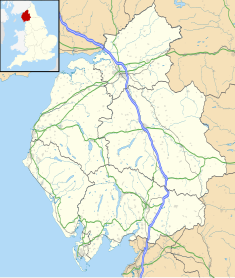Carlisle Citadel
| Carlisle Citadel | |
|---|---|
 Carlisle Citadel with the Western Tower (on the left) and the Eastern Tower (on the right) | |
| Location | Carlisle, Cumbria |
| Coordinates | 54°53′31″N 2°56′00″W / 54.8920°N 2.9334°W |
| Built | 1541 |
| Architect | Stephen von Haschenperg |
Listed Building – Grade I | |
| Official name | Former Nisi Prius Court |
| Designated | 1 June 1949 |
| Reference no. | 1196940 |
Listed Building – Grade I | |
| Official name | Former Crown Court |
| Designated | 1 June 1949 |
| Reference no. | 1196939 |
Carlisle Citadel or The Citadel is a group of buildings on the site of a former early modern fortress on English Street in Carlisle, Cumbria. It comprises two towers, both of which are Grade I listed buildings: the Nisi Prius Courthouse[1] and the former Crown Court.[2]
History
[edit]The citadel was commissioned by King Henry VIII to replace the medieval Botcher's gate,[3] which was a gateway through the city walls.[4][5] The new facility, which was designed by Stefan von Haschenperg as a medieval fortress, was completed in 1541.[3] It ceased to be a fortress and became a prison in 1611.[3] The Eastern Tower was modified to designs by Thomas Telford and Sir Robert Smirke and converted for use as a Nisi Prius Court (i.e. civil courts) in 1812.[3] The Western Tower was completely rebuilt to designs by Thomas Telford and Sir Robert Smirke and converted for use as the Crown Court in 1822.[3]
The citadel continued to be used as the local facility for dispensing justice but, following the implementation of the Local Government Act 1888, which established county councils in every county, it also became the offices and meeting place for Cumberland County Council.[6] After amalgamation with Westmorland County Council in 1974,[7] Cumbria County Council continued to use the facilities at the Citadel as offices. The County Council also occupied a series of Victorian houses on Portland Square, Brunswick Street and Alfred Street North in Carlisle[8] as well as Lonsdale House in Lower Gaol Yard.[9]
The citadel ceased to function as a judicial facility after the new Courts of Justice in Earl Street was completed in 1992.[10] It also ceased to function as a municipal facility when, as a cost-saving measure, the County Council moved to a single facility, Cumbria House, in Botchergate in December 2016.[11] The county council submitted proposals to the Government for funding to redevelop the Citadel area in April 2016[12] and published a plan to convert it into a campus for the University of Cumbria in May 2020.[13][14]
References
[edit]- ^ Historic England. "Nisi Prius Courthouse, Associated Offices and Gate Arch (1196940)". National Heritage List for England. Retrieved 6 September 2019.
- ^ Historic England. "Crown Court, Adjoining Offices and Gate Arch (1196939)". National Heritage List for England. Retrieved 6 September 2019.
- ^ a b c d e "Carlisle Citadel". Britain Express. Retrieved 6 September 2019.
- ^ "Carlisle Citadel". Gatehouse Gazetteer. Retrieved 6 September 2019.
- ^ "Carlisle Castle and Carlisle City Walls". Castles Forts Battles. Retrieved 6 September 2019.
- ^ "Local Government Act 1888". Legislation.gov.uk. Retrieved 17 August 2019.
- ^ Local Government Act 1972. 1972 c.70. The Stationery Office Ltd. 1997. ISBN 0-10-547072-4.
- ^ "Ex-county council offices in Carlisle put up for sale". News and Star. 23 November 2018. Retrieved 1 September 2019.
- ^ "Going, going gone....Carlisle's county council offices are set for demolition". News and Star. 15 March 2018. Retrieved 6 September 2019.
- ^ "Carlisle". County History Trust. Retrieved 6 September 2019.
- ^ "Cumbria County Council new offices now complete". Eric Wright. 19 December 2016. Retrieved 1 September 2019.
- ^ "£6m shops and hotel plan for The Citadel in Carlisle". News and Star. 12 April 2016. Retrieved 6 September 2019.
- ^ "Carlisle plots uni campus for £100m Citadels revamp". Place North West. 14 May 2020. Retrieved 14 November 2020.
- ^ "Public invited to have their say on ambitious new plans for a new university campus at the Historic Citadels and surrounding area". Your Cumbria. 14 May 2020. Retrieved 14 November 2020.

